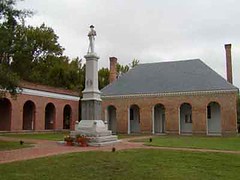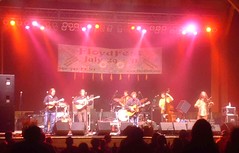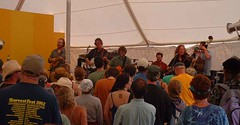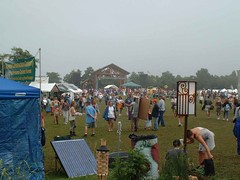
This spring
National Public Radio (NPR) began airing a series of radio essays - personal statements from listeners - Mondays on
Morning Edition and
All Things Considered under the title
This I Believe. Based on a 1950's radio program created and hosted by
Edward R. Murrow, the program sought, in Mr. Murrow's words, "to point to the common meeting grounds of belief, which is the essence of brotherhood and the floor of our civilization." As he described it in 1951,
In this brief space, a banker or a butcher, a painter or a social worker... will write about the rules they live by, the things they have found to be the basic values in their lives.
According to the
This I Believe web site,
Each day, millions of Americans gathered by their radios to hear compelling essays from the likes of Eleanor Roosevelt, Jackie Robinson, Helen Keller and Harry Truman as well as corporate leaders, cab drivers, scientists and secretaries -- anyone able to distill into a few minutes the guiding principles by which they lived. Their words brought comfort and inspiration to a country worried about the Cold War, McCarthyism and racial division.
Revived by a group of veteran radio producers led by Dan Gediman and Jay Allison, Mr. Murrow's idea of looking for "common meeting grounds" has been expanded. Again from the
This I Believe web site,
In reviving This I Believe, Allison and Gediman say their goal is not to persuade Americans to agree on the same beliefs. Rather, they hope to encourage people to begin the much more difficult task of developing respect for beliefs different from their own.
Notwithstanding the difficulty of balancing looking for "common ground" and "respecting differences," the series is well done, interesting and thought provoking. The title is also misleading.
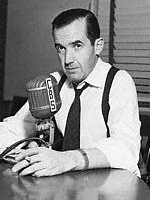
Those of you who have known me over the years must realize how difficult it is for me to write anything negative about NPR or its programming. I am an NPR junkie. All of the presets on my car radio are to public radio stations. I am a long time listener, about 30 years worth. But
This I Believe has it wrong. Worse, the problem started with Ed Murrow, the patron saint of radio journalism.
The common themes within these radio essays are generally
values, not
beliefs. Values and beliefs are not the same thing. Granted, these words are often (mis)used interchangeably. But there is a reason these different words exist. They mean different things.
From Websters, 1913 edition,
Believe - To exercise belief in; to credit upon the authority or testimony of another; to be persuaded of the truth of, upon evidence furnished by reasons, arguments, and deductions of the mind, or by circumstances other than personal knowledge; to regard or accept as true; to place confidence in; to think; to consider; as, to believe a person, a statement, or a doctrine.
Further, when we explore the usages of Belief we find,
Belief -
1. Assent to a proposition or affirmation, or the acceptance of a fact, opinion, or assertion as real or true, without immediate personal knowledge; reliance upon word or testimony; partial or full assurance without positive knowledge or absolute certainty; persuasion; conviction; confidence; as, belief of a witness; the belief of our senses. Belief admits of all degrees, from the slightest suspicion to the fullest assurance. Reid.
2. (Theol.) A persuasion of the truths of religion; faith. No man can attain [to] belief by the bare contemplation of heaven and earth. Hooker.
3. The thing believed; the object of belief. Superstitious prophecies are not only the belief of fools, but the talk sometimes of wise men. Bacon.
4. A tenet, or the body of tenets, held by the advocates of any class of views; doctrine; creed. In the heat of persecution to which Christian belief was subject upon its first promulgation. Hooker.
Here we see the strong connection between belief and faith, and between faith and religion. We also see the distinction between belief and knowledge, especially personal knowledge gained through the senses. Belief is, in essence, a necessary "best guess" as to the nature of things about which we have little or no personal knowledge. It helps us through the day, gets us through the night. Personally I strive daily to increase the number of things I know while proportionally decreasing the number of things I believe. But I know others have different values.
Values, withing this context, are generally principles, standards or qualities considered worthwhile or desirable by the person who holds them. Further, values are frequently described as a basis of behavior, the foundation of choices made by individuals or groups. Values, like beliefs, may be shared and passed from generation to generation, formally or informally.
These guiding principles may indeed grow out of a belief or system of beliefs. Or they may spring from life's personal experiences, the retelling of which making good radio. Or a combination of the two.
Both values and beliefs have their place in the world and may be related; but they are not the same. Murrow knew this in 1951, writing in the quote above of "the
rules they live by, the things they have found to be the basic
values in their lives." (emphasis added) But he selected
This I Believe as the program's name. I suppose his Bible-belt roots made it easier to choose the more rhetorically powerful title over one more accurate.
Am I making too much of this? Probably. Is the distinction I am trying to make important enough to change your radio listen habits? Of course not.
This I Believe is a wonderful series. It is worthy of your time. Unfortunately the title invites muddy thinking caused by poor use of language. In that it is far from alone, nor the worst offender. With words like beliefs, values, and faith being applied once again into our political discourse - like dry rub on ribs in Memphis - I am getting more than a little sensitive to the misuse of our language, deliberate or not. More on that topic later.
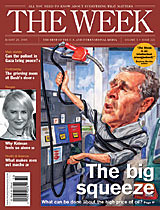 Shortly after lamenting on this blog of the sad state of U.S. weekly news magazines I received a promo letter for a magazine I had never heard of, The Week. It sounded interesting and seemed cheap. So I sent in the subscription card and waited. In short order I received my first copy.
Shortly after lamenting on this blog of the sad state of U.S. weekly news magazines I received a promo letter for a magazine I had never heard of, The Week. It sounded interesting and seemed cheap. So I sent in the subscription card and waited. In short order I received my first copy.